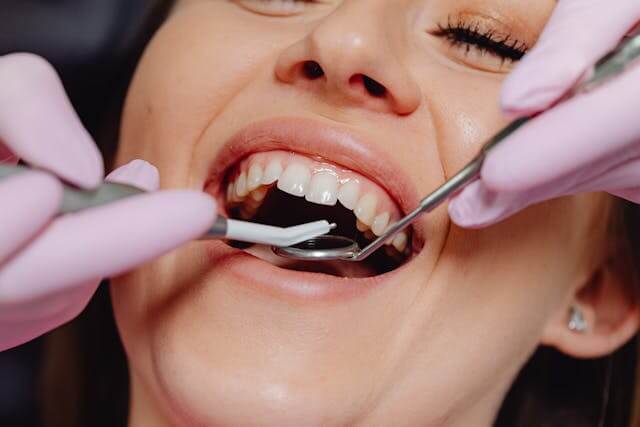The gum or gingiva is part of the supporting structures of the teeth. When the gums become swollen, it is an indication that something is wrong with it and requires Treatment.
Treatment for swollen gums can range from simple home remedies to procedures in the dental clinic.
What Is a Swollen Gum?
Gum swelling is an abnormal increase in the size of the Gum or gingiva. The swelling may be around one or more teeth. Sometimes, a swollen gum may resolve spontaneously and not require treatment.
Causes of Swollen Gums
There are various causes of swollen gums. The following are common causes.
Accumulation of Plaque and Calculus
Poor oral hygiene encourages build up of plaque and calculus on the teeth. The presence of these tooth deposits can have a negative impact on the gums (marginal gingiva), causing it to swell.
Swollen gums that are due to plaque and calculus do not usually require an invasive treatment as they resolve after a professional teeth cleaning to remove plaque and calculus, and by effective oral hygiene practice.
Foreign Body Impaction
Trapping of a foreign body such as fishbone or apple within the gum can cause swelling of that gum.
Foreign bodies trapping within the gum is usually an accidental occurrence during eating, or while undergoing a dental procedure. Dislodging impression material into the gums, pushing obturation material more apically, and needle breakage during dental procedures are some examples.
Swollen gums resulting from a foreign body impaction will require treatment from a dentist.
Use of Certain Medications
Certain drugs have the potential to cause swollen gums, especially when used for a long term treatment of a medical condition.
Some medications used in the treatment of certain health conditions can cause swollen gums as a side effect. These include:
- a class of antihypertensives called calcium channel blockers. Examples include nifedipine, diltiazem, and verapamil. Nifedipine is most commonly associated with swollen gums or gingival overgrowth.
- drugs used in the treatment of epileptic conditions known as anticonvulsants. A good example is phenytoin. Other drugs in this category implicated with swollen gums are barbiturates, valproic acid and carbamazepine.
- Immunosuppressants. These are drugs used to manage organ transplant rejection and autoimmune diseases. A good example is cyclosporine.
Hormonal Conditions
Hormonal changes that take place during puberty and pregnancy have a tendency to cause swelling or enlargement of the gums.
According to Cleveland clinic, pregnancy induced gingival swelling is due to increased levels of oestrogen and progesterone.
During puberty, increase in the levels of the sex hormones can cause increased response to plaque and calculus resulting in gum swelling. Teaching your adolescents to practice good oral hygiene will help them not to experience such swelling of the gums.
Pyogenic Granuloma
This is a tumour-like spherical swelling that usually occurs in areas of chronic irritation or trauma within the mouth. The most favoured site is the gum or gingiva.
Causes of pyogenic granuloma have been attributed to irritations from calculus in individuals with poor oral hygiene, and from overhanging restorations.
According to Medscape, a study in 2010 reported a case of pyogenic granuloma due to an implant.
Vitamin C Deficiency
Vitamin C deficiency or scurvy is a rare health problem these days. However, if for any reason it does occur, it could result in swollen and bleeding gums. This is because vitamin C is important in the synthesis and maturation of collagen by the body. Collagen provides structural integrity to the gingiva.
Systemic Diseases
Certain systemic diseases can have serious intraoral manifestations such as bleeding gums, bruisings and swollen gums, which will require treatment by an oral health-care professional. These diseases include leukaemia and granulomatous diseases (e.g. granulomatosis with polyangiitis, sarcoidosis).
Leukaemia
Leukaemia is a type of blood cancer caused by proliferation of abnormal white blood cells in the body.
Gingival enlargement due to leukaemia occurs when the premature forms of a type of white blood cells called leukocytes infiltrate the gums.
The diagnosis and treatment of leukemia is made by hematologists. However, a dental professional treats the swollen gums and other oral manifestations once the haematology team certifies that the individual can undergo dental treatment.
Granulomatous Diseases
They are a group of conditions that include Wegener’s granulomatosis and sarcoidosis..
Wegener’s granulomatosis, also known as granulomatosis with polyangiitis, is a rare autoimmune disease that affects different organs of the body.
It causes gum swelling and tiny spots of bleeding on the gingiva, that is what doctors call petechiae.
Gingival Tumours
These are neoplastic enlargements (enlargement due to abnormal cell growth). They range from benign conditions like fibromas to malignant or cancerous conditions like oral squamous cell carcinoma.
These tumours manifest as swollen gums, which may or may not be painful, but if there is no treatment can interfere with feeding, speech or cause aesthetic problems.
False Enlargements
Some swollen gums are not true gum enlargements, but rather increase in the size of the bones of the jaws. For example, a mandibular torus might be mistaken for a swollen gum, when it is simply a bony exostosis (bony outgrowth).
At other times the bony enlargement may be due to a disease condition e.g. Paget’s disease.
Another form of false gum enlargement is the bulging on the gum when a child is erupting a tooth. (Tooth eruption is the burrowing of a tooth through the gums to surface in the mouth).
Treatment Options for Swollen Gums
The treatment for swollen gums is dependent on identifying and eliminating the causes.
Prophylactic Tooth Cleaning
Treatment for swollen gums due to poor oral hygiene is by getting professional teeth cleaning and by doing warm saline mouth rinse. It is that simple. If you are experiencing swollen gums, bleeding on brushing or halitosis, you can visit your dentist for a scaling and polishing procedure.
Invasive Procedure and Medication
If the swollen gums are as a result of a foreign body lodging within your gums, the first part of the treatment will be to remove the foreign body followed by antibiotics and warm saline mouth rinse.
Your dentist will remove the foreign body after opening up the gums under local anaesthesia. He will prescribe antibiotics if the foreign body causes infection and pus discharge.
Leave Alone
Leave alone is also a form of treatment. For example, where the use of drugs is responsible for the swollen gums, the treatment will be to change to another drug that does not have gum swelling as a side effect. The gingival enlargement usually resolves shortly after withdrawing the medication causing it.
There may also be a need for surgical excision of gingival overgrowth if it fails to resolve or if it interferes with basic functions such as chewing or aesthetics.
If you notice gum swelling after using a particular drug, don’t panic. Visit your physician for adequate care.
Where pregnancy is responsible for your swollen gums, there may not be need for any treatment as the swelling will resolve after childbirth. If however, the gum swelling fails to resolve, surgery will be a treatment option.
Surgical Excision
The treatment for pyogenic granuloma is usually by surgical excision of the gum overgrowth. However, if the gingival enlargement is small, it might resolve spontaneously after the removing the irritant causing it.
Gum swellings due to systemic diseases can be addressed after the disease causing it has been controlled. If you are being managed of any systemic disease like granulomatous disease or leukaemia and you are experiencing gum swelling, you have to visit your physician.
You can leave alone false enlargements due to bony exostosis, especially if they are not causing aesthetic and functional problems. If however, you are not okay with them, or in a situation where they interfere with function, you can remove them through surgery.
Conclusion
As the causes of swollen gums vary, so also the treatment varies. If you are suffering from swollen gums, it is necessary that you see your dentist. He will determine the best treatment for you after proper evaluation.
Whereas there are a couple of home remedies you may want to try, it still does not replace seeking the help of a professional for proper diagnosis and treatment.









